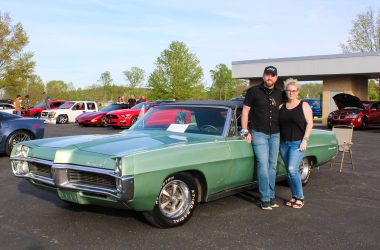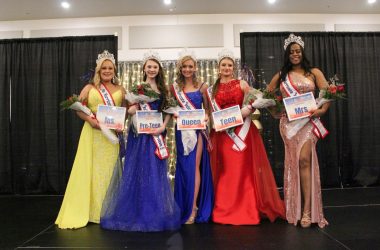Editor’s Note:
The apple butter making photo featured on last week’s front page triggered memory of the following article which was published in the September 19, 1985 issue of the Breeze.
At the request of readers, we are republishing Irene Ambler’s article.
By Irene Ambler
My grandmother, Eudora Billups Burns, came to live with us in August, 1929, and was a most important part of our home until her death on June 22, 1962. Had she lived until July 22 of that year, she would have been ninety-four years of age.
Before coming to live with us, Granny had resided happily and busily at a small hillside farm on Cow Creek, Teays Valley District, with her stepson. Granny had taken a life’s savings of six hundred dollars and borrowed one hundred, fifty dollars from her brother, and the little homestead was purchased. Life was hard and luxuries were few; but the loan was prepaid upon sale of a tobacco crop and a milk cow, making the entire indebtedness of seven hundred, fifty dollars free and clear. The soil was not very fertile and the hills were for the most part untillable; but the soil was good enough to raise tobacco to sell, corn for the cows and good vegetables to eat and preserve for the winter and early spring. The steep hillsides made enough pasture for the one or two cows; and the rich milk and yellow butter were plentiful. Sometimes, though, the butter was not so yellow. In wintertime, sometimes it was almost white. But it was good stirred up with sorghum molasses and eaten with saucer-sized biscuits on a cold, wintery morning about daylight.
I spent many a happy day at Granny’s house before she left her little home. And I learned many things, too. I learned that one of the most interesting things in the world was a wooden salt box which hung near the kitchen window full of coarse salt. I learned that coarse salt is the best-tasting salt in the world on fresh, red tomatoes and crisp green cucumbers. I learned about the unutterably-delicious aroma of green-bean coffee roasting in the oven and the sheer joy of grinding that coffee in the coffee mill—just enough for each pot full of boiling-hot, strong coffee with each and every meal. I learned about the absolute, unadulterated power in a cup of black coffee made with fresh-ground beans.
I learned to eat groundhog (which tasted like “chicken”) and turtle (which tasted like “chicken”) but I never thought they tasted like chicken. I suspect I was told about the similarity because I might consider those two delicacies more palatable to my untrained taste buds. I could never learn to relish the taste of possum even if it was parboiled and roasted with a pan of sweet potatoes. I did love rabbit gravy and the biscuits, though.
Life was rustic, work was hard, but still there was lots of fun. I learned the fun of poking in a crawfish hole and being reprimanded for it. I learned how to call a doodle-bug from its hole. And I learned how to take twigs and sticks and wrap scraps of brightly-colored cloth around them and love them as much as the pretty dolls I had at home. I learned how to take little blocks of wood and make trenches ‘neath Granny’s big tree in the front yard and pretend that I was driving cars.
One of the most joyous things I was allowed to do at Granny’s house was to sweep her homewoven rag-rug carpets. The carpets were woven on a loom by someone. They were the width of throw rugs and they were sewn together lengthwise to cover the entire floor. I loved to sweep those floors with the stubby broom because it made me feel important to see all the dust flying through the house. After the dust settled, I took a cloth and dusted everything good.
Never will I feel the security I felt as a very small child at crawling into Granny’s feather bed on her scratchy, homemade sheets, which were scrubbed on a board with lye soap, wrung by hand and hung for an entire day in the boiling hot sun, Sometimes we went to bed before it was completely dark (which I wasn’t accustomed to); and I could stay awake and listen to the whip-poor-will on early spring nights and the thunder on hot summer nights.
I learned, too, that all of life was not puppy dogs and pussy cats and grinding coffee. I learned of the sorrow and grief of a family who lost their mother during one of my visits to Granny’s house. Granny’s friend, who lived “back on the hill” passed away. She was one of Granny’s very best friends; and Granny took me up the hill to Peach Ridge Church, where the funeral was conducted. It was warm weather and I was wearing a little dress with a yellow waist and a checked skirt. The sashes were sewn to the sides and tied into a bow in the back. It rained; and although the undertaker had a big, black hearse, the steep red clay road to the church was deeply rutted and vehicular traffic would have been impossible. The horses struggled to pull the weight up the hill; and the rain made dreary, desolate rivulets in the tracks. I was sad and seemed to me as if even the heavens were weeping.



